#case of shinra
Explore tagged Tumblr posts
Text




The flashback scene in Case of Shinra where Rufus escapes death because his 5 year old self asked his dad a simple question. Plus a following scene that made me laugh.
#my scans#final fantasy vii#ff7#case of shinra#rufus shinra#him wanting to shake the hand of his kid self immediately made me think of that meme of the office handshake#rufus also knows hes a pathetic little meow meow
68 notes
·
View notes
Text
People are headcanoning Sephiroth as illiterate now. As in. The fucking reason he took so long in that basement was because he had to finger-read every single fucking book.
I'm putting Sheltered Sephiroth on the top shelf until you goons stop veering into outright ableism. For fuck's sake.
#scrawny rambles#ffvii#sephiroth#these people confuse vulnerability with infantilisation so much#it's driving me insane#this has been happening for years but it's hit a peak#i GET wanting to knock seph off his pedestal and make him human like the rest of us#especially after the Sexy Leather Daddy who Does Everything Flawlessly era#but like. This is downright ableist. They didn't say he had dyslexia they said he was *illiterate*#quick question Why the Fuck would ShinRa neglect their top soldier to this degree#reading is VITAL in systems like these you think Sephiroth ISN'T sifting through piles of paperwork on the reg???#of all the characters to pick this has gotta be one of the worst#i've seen people make similar shitty claims about zack's education#(who is btw another vector for just. Stunning fanon ableism what the fuck)#but in that case even if it were *initially* true#ShinRa would almost certainly have funded the rest#there's a sliding scale of literacy but you NEED at least some to work in fucking *ShinRa*#curse be upon you cris for dropping this on my doorstep 😭😭#this fandom loves confusing vulnerability with infantilisation. most do but again. What the Fuck.#disk horse#fandom wank
34 notes
·
View notes
Text
the important thing to know about genesis in crisis core is that he literally did nothing wrong. not only justified but with a valid way of doing things. he had a point.
#grin talk#genesis rhapsodos#ffvii crisis core#ff7 crisis core#ffvii spoilers#crisis core in many ways is an interesting case of being the bad guy until the very end#we protect fucking HOJO. the first level is literally killing a train full of people that Look like theyre on our side but no no no#i promise theyre totally wutai. its fine.#(and tbf thats not. what im implying isnt canon. but its in character for shinra and also a trope)#regardless like. zack works for shinra. zack fights for shinra. shinra fucking sucks. every single SOLDIER 1st defects and dies in CC.#we begin the game chasing after a SOLDIER 1st who went. Weird(tm) upon realizing he is genetically modified part alien.#hurrr genesis defecting from shinra destroying all sorts of stuff fighting against shinra also weird magic hurrr terrible awful#And Then We End The Game As Zack Fair who does THE SAME THING.#even having a turk follow and confront the him in his hometown.....#this is becoming off topic. genesis did nothing wrong. crisis core is a cyclical story. the real villain is hollander and hojo#but i think we all know that.
8 notes
·
View notes
Text
The great thing about Mob Psycho is that while I definitely have my favorites, the whole cast is so strong that any time I see a post about a minor character I'm like "YEAH!! I LOVE THEM ALSO!!!!!"
The terrible thing about Mob Psycho is that this makes me want to write long plotty fics about absolutely everyone but alas I am just one person and also cursed :(
#i need to get back to In Case Of Emergency i miss my dumb gay jocks#and also all the Scar cameos#i think literally the only characters i don't get excited about seeing content for are Roshuuto and the security guard#everyone else is Great#i also love when i find someone who's super fixated on a minor character bc i'll be like yes!!!#at least one person giving them the content they deserve!!!#tho some characters it's hard to find any content for. alas.#i wish there was someone out there giving Shinra the Joseph From The Government treatment#mob talk
24 notes
·
View notes
Text
SHINRA LOWERED THE AGE REQUIREMENT FOR THE ARMY BECAUSE OF SEPHIROTH?
WHAT??
#chat is this real#ff7#ff7 ever crisis#ff7 crisis core#saw it in a post before i had tumblr#in which case I cant find it#but it looked like a legit theory cus they made good points and took a screenshot of a dialogue mentioning it#the game was ever crisis i think#fuck shinra
4 notes
·
View notes
Text
#blorbo poll#shinra kusakabe#Vanitas#Kometani Chusaku#saonji ukyo#kurapika kurta#fire force#the case study of vanitas#komi can't communicate#dr stone#hunter x hunter
11 notes
·
View notes
Text
(( im really stanning the idea of heid dragging people down with him. he goes down for war crimes? so are the turks. so is reeve. so is rufus. like, this man is petty, holds a grudge and is a savage - he's the type of man who - if he's going to hell - everyone's coming with him. ))
#really wanna explore this dynamic?#i know its at ouchy subject for people with shinra but-#reeve rufus turks etc are good not in a tradional sense but theyre anti-villains#but theyre still in shinra#in the og - rufus is still p cold and brutal#the turks follow the orders to drop a plate on s7 so they arent cherubs#reeve stands back and allows shinra to be evil a/f#they say silence makes you part of the problem in reeves case#and i just imagine like-#heid getting punished for all of the atrocities hes done but he just takes everyone down - or ATTEMPTS to#i think about like how he would rip apart someone's soul by making them feel guilty#i just- i need to like harrass a reeve or something
15 notes
·
View notes
Text
Finally learning the meaning of all the charas names now that ive seen the ending and can safely go on the wiki
#i finally learned that mobs nickname is an alternate pronunciation of his given name!!!! which i didnt understand#obviously bc i dont speak it but i was wondering if backstory on it would be given but its just something that is part of the language :D#also theres a lot of place/food/flower related names#which like obviously places and flowers are fairly common things to inspire names and like rice paddy is a place as well#but i also think its interesting bc like w/ characters like reigen his name is fully just a pun and is chock full of double meaning#but then with other characters thst is not as much the case??? like serizawa just as a example i think means like celery marsh? so its#a place and not just a pun#and then you have shinra who also has an entirely pun name#as well as tsubomi#so its interesting which characters names are like entirely like punny phrases and which ones obv also have double meanings bc thats common#in story telling but arent as like kind of tongue in cheek as much as reigen is bc like theres a lot of meaning u can take from mobs name#but its also like not a play on a phrase??#hmmmm interesting#talking tag
0 notes
Text
on Sephiroth's manipulation of Cloud (an analysis)
— Rebirth + OG FF7 spoilers
how Rebirth tackled puppet Cloud is so unique and so so good, and I just needed to talk about it. first things first, let’s talk about what Sephiroth means by ‘puppet.’
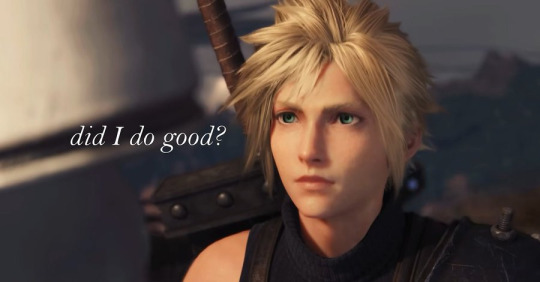
throughout the OG FF7 and Rebirth, Sephiroth refers to Cloud as a ‘puppet.’ it may seem strange at first glance, because it seems to imply that Sephiroth is manually taking control of Cloud, puppeteering him or that Cloud is inherently empty.

it also doesn’t fit with his encouragement of Cloud’s rage. if Cloud is a puppet, why doesn’t Sephiroth just give him rage?

because that’s not what he means. when Sephiroth calls Cloud a puppet, he means that Cloud’s mind can easily be shaped, similar to how a puppet’s identity is dependent on its master. he says that what Cloud feels is fake because Cloud’s mind is a collage of identities, his own and Zack’s, all with Jenova’s and Sephiroth’s influence. Cloud’s feelings are just his master’s feelings.
Cloud’s mind is malleable. he is his own person, the real Cloud Strife is there, but due to the self-esteem issues he’s harbored since childhood and the trauma he’s endured for the past five years, the presenting Cloud Strife can greatly differ. Sephiroth is intensely aware of this, and takes advantage of it.
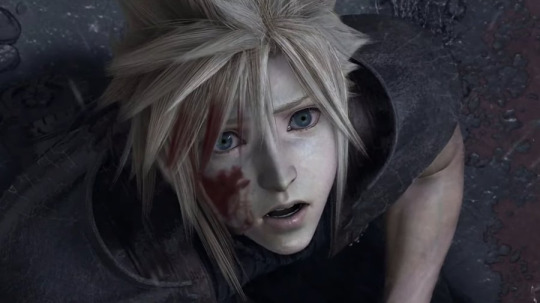
the persona we see of Cloud is his SOLDIER persona, the tough badass he always wanted to be, a mixture of his interpretation of Zack and his interpretation of being a hero. but the facade cracks quickly and frequently, in either direction. mostly, it cracks to let us see the real Cloud. there’s no one single moment where he shines through: Cloud taking on odd jobs with no real gain other than him helping someone, Cloud doing something stupid and silly, Cloud getting flustered. all the moments of him being kind and dorky is the real Cloud shining through. it’s impossible for Cloud to bury all of himself beneath his persona, so these cracks are only natural. however, the other cracks in his persona are due to Sephiroth’s manipulation.
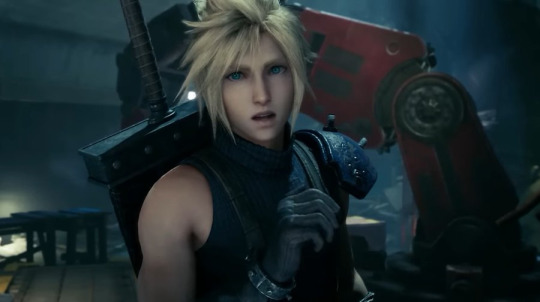
in Rebirth, Cloud kills multiple people on multiple occasions—one can argue because they were Shinra, they deserved it, but that doesn’t change the fact that Cloud isn’t a killer. even his SOLDIER persona accommodates his desire to help people; so how does he kill people so easily? if you answered Sephiroth, you get a prize!

Sephiroth manipulates his SOLDIER persona in two ways: feeding into ideals and planting ideas. for the first, he (off-screen) encourages violent and/or anti-social behavior in Cloud. while we, the player, and everyone around him views this as strange, in Cloud’s mind, it all fits into what he’s supposed to be. he’s supposed to be a badass, and badasses kill people and dismiss their friends’ feelings, right?
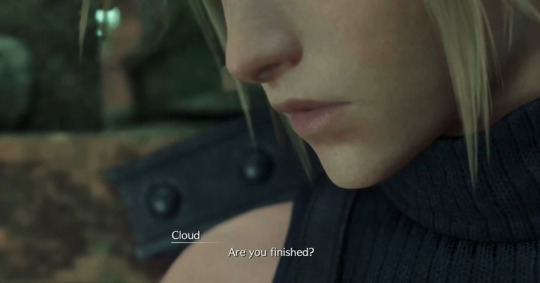
when Cloud is in this mental state, it’s very hard to reason with him. in Chapter 13 (one of the greatest pieces of puppet Cloud literature), Cloud’s entire goal is to reach the center of the Temple in order to acquire the Black Materia. he doesn’t listen to any warnings that the Cetra give or his teammates, becoming wholly focused on retrieving it. but even then, even if Cloud’s behavior doesn’t seem strange to him, why does he want the Black Materia?
that’s due to Sephiroth’s other form of manipulation: planting ideas. it’s easy to force Cloud to become violent because it fits the narrative of badass SOLDIER, but lots of other ideas need time to nourish. case-in-point: Tifa isn’t the real one.
we are introduced to this idea at the very beginning of the game, Cloud walking through the inn at Kalm when he sees Sephiroth who tells him that this Tifa isn’t the real one. the conflict seems to become resolved when Cloud repeats the idea to Tifa who completely dismisses it, but they’re nowhere out of the woods.
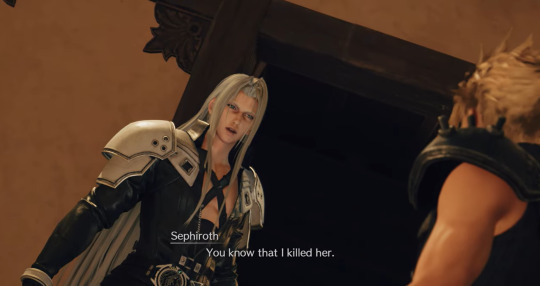
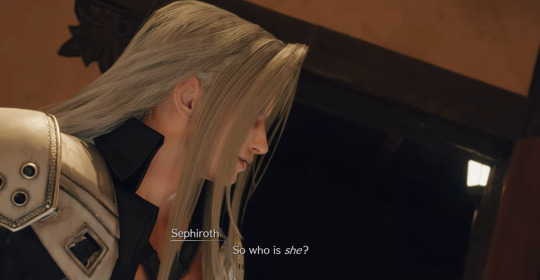
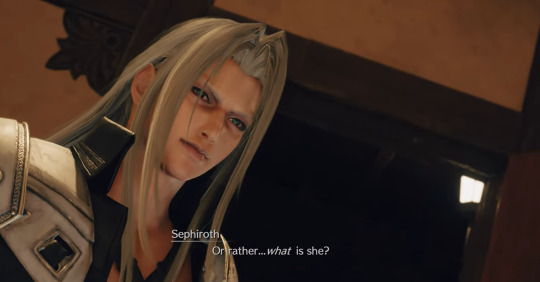
next, Sephiroth in Chapter 5 instills the idea that Jenova is capable of impersonation. this doesn’t seem to go anywhere until Chapter 9.
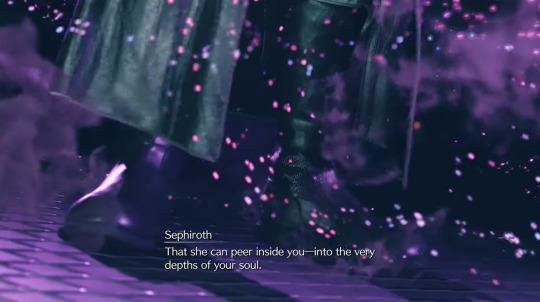

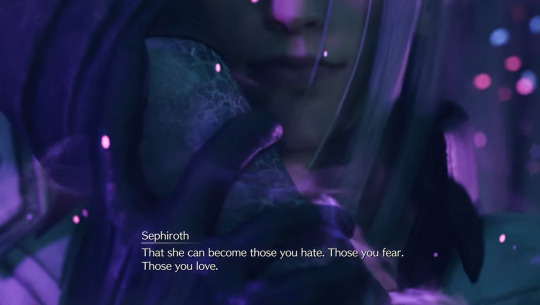

first, Cloud enters that intensified SOLDIER state-of-mind, killing all the Shinra troopers around him. with his mind already fragile, Sephiroth repeating the idea to him now becomes fact: Tifa isn’t real. she is an imposter from Jenova. both the ideas Cloud’s been fed are twisted and he pushes Tifa off the edge.
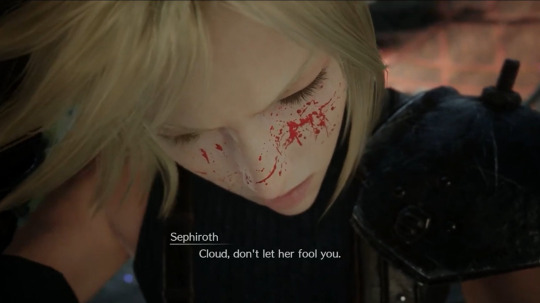

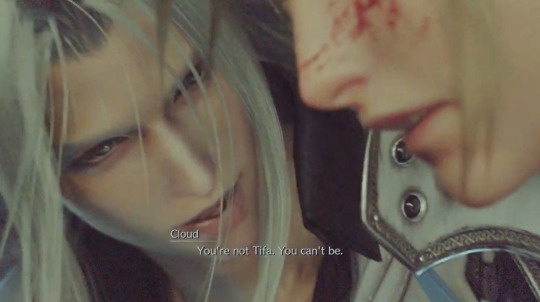

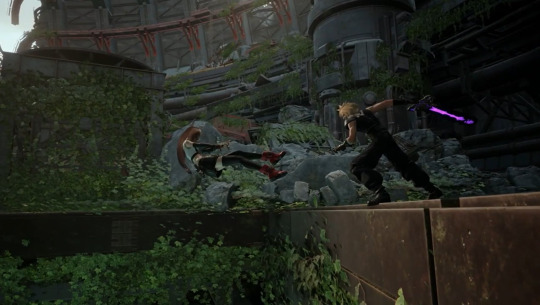
Cloud snaps out of this state of mind right after, but it doesn’t change the fact that it happened. as long as Sephiroth plays his cards right, he can manipulate Cloud into doing nearly everything for him. hence, the ‘puppet’ label.
(that’s also why Cloud wants the Black Materia. Sephiroth tells Cloud to bring him the Black Materia—and even if Cloud doesn’t want to, the thought is engraved in his head that he should retrieve it for Sephiroth.)
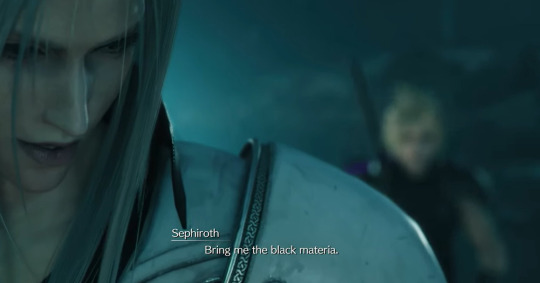
but here’s what’s really special. as we’ve noted, the intensified SOLDIER persona is violent, anti-social, just an all around dick. he doesn’t care about his friends, doesn’t care about anything except getting what he wants (see: what Sephiroth wants.)
but we see something very different at the end of Chapter 13. Cloud isn’t rude and dismissive. he pushes Tifa, but he doesn't do it with the same malice as in Chapter 9. he does it in an attempt just to get her away, just to chase after the Black Materia.

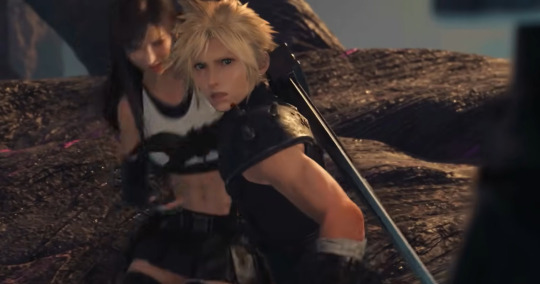
in his pursuit of Aerith, the things he says are the farthest thing from rude. he’s not threatening or demanding her to stop. he’s asking her to talk, appealing to her desire to trust him and save the planet, even starts calling her name in a teasing way like he’s playing a game.
Aerith! Let's talk. I need it... Aerith... Give it to me. Please? You can trust me. Let's save the planet together. (playfully) Aerith.
when Aerith finally gives him the Black Materia, what does Cloud do? he could just walk away. he could just run straight to Sephiroth. but, no—he makes sure to say “thank you” first.
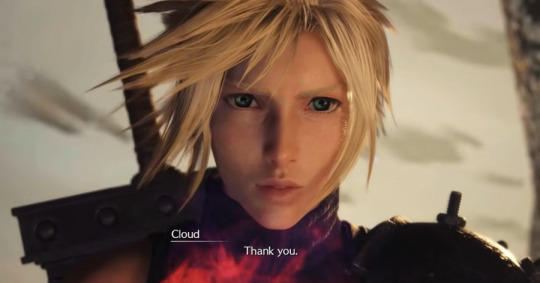
it’s pathetic (I type this in the most endearing way) the way Cloud acts. why is that? what is the difference between these types of manipulation? the answer is who Sephiroth manipulates. for the most part, Sephiroth manipulates SOLDIER Cloud. but here, Sephiroth breaks through Cloud’s SOLDIER persona to manipulate the real Cloud.

we know when we see the real Cloud: if you need a refresher, anytime Cloud is kind or acts like a dork is usually a tell-tale sign. here, Cloud is kind, saying please and thank you. and it’s almost cute, the way he playfully calls out to Aerith. this is the real Cloud, buried under piles of piles of trauma, self-hatred, and alternative personas.
and what is the real Cloud’s utmost desire? to love and be loved. he wants to be a hero, to be worthy of the ones he holds dear; no, to be worthy of anyone. this is a big factor into Cloud’s construction of his SOLDIER persona, he creates himself that hero mask that he thinks will lead to the love he craves.
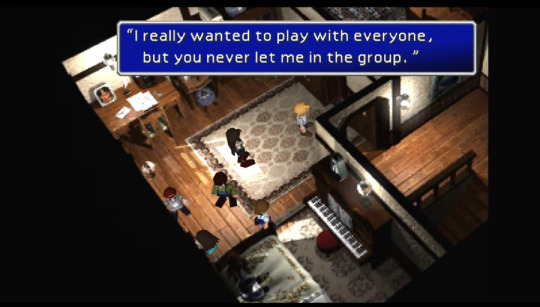
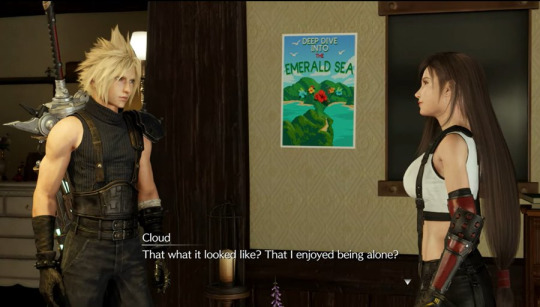
Sephiroth knows this, and twists his desire to be a hero to a desire to please Sephiroth at all costs. Cloud is still himself, but he wants to make Sephiroth happy no matter what. Sephiroth wants the Black Materia? then Sephiroth will get the Black Materia.
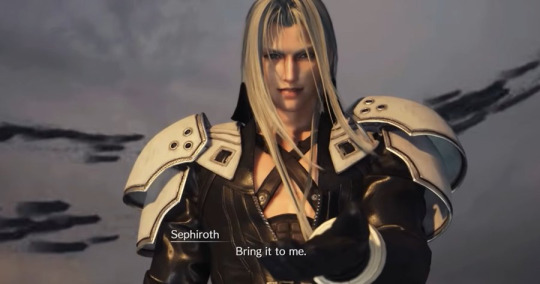
that’s what’s so heartbreaking (and deliciously good) about Rebirth’s depiction of puppet Cloud. he’s not hollow and empty. he’s desperate. this is the most of the real Cloud we get to see. we see fragments of him, but here is the longest consecutive period. this is the realest he acts in the game, kind and silly and so fucking desperate for love, for Sephiroth’s approval.

in short, Sephiroth knows exactly how and when to break Cloud. he knows how and when to manipulate SOLDIER Cloud and he knows how and when to manipulate the real Cloud. this is why Sephiroth calls him a puppet: as long as he plays to Cloud’s desire for approval and love, he can puppeteer him in every direction.

thank you for reading! I hope you learned something new or just understand Cloud better. Cloud is such a fascinating character and Sephiroth really brings out the most pathetic parts of him ❤️ here's to hoping Cloud gets all the love he wants
#ff7#ff7 rebirth#rebirth spoilers#ff7 meta#meta analysis#stuff from twitter#cloud strife#sephiroth#sefikura#literary analysis is my special interest
956 notes
·
View notes
Note
Hi i really liked your genesis headcanons can you do relationship headcanons for seph and ang, thanks btw
Not sure if you came from that post, but I made one for Genesis a while ago in case you want to read it! Here's the link.
Dating Sephiroth
• Completely inexperienced in relationships and romantic feelings in general, initially suppresses his own emotions out of habit, but eventually caves for his person. He treats dating like research at first, reading extensively and trying to understand the "proper protocols" for courting someone (he's so sweet)
• Takes time to open up due to his isolated upbringing, but when he does, he forms an intense, almost obsessive attachment to his partner (i n t e n s e)
• Struggles to express emotions verbally but shows his love through unwavering loyalty and dedication. Will move mountains for his partner if needed. His partner is sick? There goes Sephiroth concocting medicine from scratch bc he doesn't trust Shinra. Partner is hungry? Sephiroth in the kitchen trying his best to make them their favorite food before giving up and ordering out. Partner is cold? There goes Sephiroth's coat and his partner's personal space because now they're bundled in his leather while being squished by a giant kitty.
• Very touch-starved but doesn't know how to initiate physical affection in the beginning. Melts completely when his partner casually touches him or plays with his hair. When he and his partner grow comfortable with each other, Sephiroth absolutely will drape himself over them like a cat, ask for cuddles, and use them as a human plushie.
• Protective to an extreme degree. Has to consciously work on not shadowing his partner everywhere or eliminating perceived threats before they even manifest….like the mailman. Experiences jealousy intensely but internalizes it rather than acting out. Needs frequent reassurance that his partner won't abandon him ;-;
• During fights, he tends to shut down emotionally, not knowing how to handle conflict in relationships. He needs a patient partner willing to help him work through his feelings and to be there to hug and tell him he's still loved.
• Cherishes quiet domestic moments he never had before; simple things like sharing meals or reading together mean the world to him.
• Extremely observant of his partner's needs and preferences. Will remember every little detail about them and use that knowledge to make them happy. That candy their partner mentioned liking in passing? There's now boxes of it in their pantry and Sephiroth bought a monthly subscription to it.
Dating Angeal
• Takes relationships seriously, okay? The man dates for marriage and a life partner, not for a casual fling. And he believes in building a foundation of trust, respect, and understanding before pursuing anything romantic.
• Very traditional in his approach to courting and is a complete gentleman. Will absolutely ask for permission to court his partner properly and plans thoughtful, wholesome dates like picnics, hiking, or cooking together.
• Shows his love through acts of service and protection. Will make sure his partner is well-fed, safe, and cared for. Grows herbs and vegetables specifically for cooking their favorite meals and/or making healthy versions of their favorite junk food. Food is his love language, and there's nothing that makes him happier than cooking for his partner.
• Tender and gentle in private, to an extreme degree. Babies the hell out of his partner and loves quiet moments where he can hold them, talk to them, and care for them.
• Gets adorably flustered by open displays of affection but secretly loves when his partner is demonstrative with their love. Will turn bright red if they so much as hold his hand in public. Yet he casually wraps his arms around their waist when they're out to send a message to the world lol.
• Very protective but not possessive. He trusts his partner completely and respects their independence. His protectiveness comes from a place of genuine care rather than jealousy. But that's not to say Angeal won't break someone's teeth in for trying to get with his partner.
• He's the voice of reason during arguments who tries to resolve things calmly through communication.
#ff7#ffvii#final fantasy 7#sephiroth#final fantasy vii#angeal hewley#ff7 crisis core#crisis core#sephiroth x reader#angeal hewley x reader
173 notes
·
View notes
Text
Running through the Shinra tower in Remake is legit making me mad lmao.
No Sephiroth exhibits anywhere. No posters. No displays. No memorabilia. And he was their prized soldier. Their pet, their special posterboy for years. Literally raised by them. They stole him from his mother and effectively exploited him for his entire life. And there were absolutely no posthumous acknowledgements for him at all. Not a peep. They literally used and abused him and then dumped him at the first opportunity.
All I'm saying is that, in the case of what happened with President Shinra at least, Sephiroth did nothing wrong. Like, he is 1000% culpable for everything ELSE. Can't stress enough that Seph is an evil bastard who deserves to pay for what he's done. But in this one instance, he was completely justified.
Rotten asshole had it coming.
#sephiroth#ff7#ffvii#final fantasy 7#sephcanons#crisis core#final fantasy vii#President Shinra#ffvii remake#Ff7r#ff7 remake#ff7 rebirth#ff7rb
113 notes
·
View notes
Note
I was curious about a HC for Sephiroth with a quiet S/O that loves to sing when they’re alone?
໒⦂ 𝐌𝐄𝐋𝐋𝐈𝐅𝐋𝐔𝐎𝐔𝐒.
notes. hello anon! i’m not sure if you just wanted one hc so i added a good amount to suffice enough for a post, hope you enjoy and that they are to your likings<3
genre. fluff + comfort
sephiroth x gn!reader.
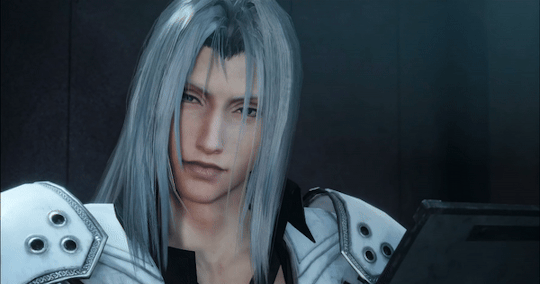
⌗ sephiroth has known you to be a rather soft spoken individually, often reserved amongst others — though he didn’t particularly mind it. he had similar habits, anyway — if anything it made him feel less alone..
⌗ with him, however, you were thankfully a bit more talkative — as was he, with you. it just felt more comfortable for you both to fully express yourselves, especially your lover.
⌗ but something told your beloved that you were keeping some quirks secret.. certain little things — habits of yours.
⌗ particularly the melodic voice that greeted his ears one chilly evening when he’d arrived home from a dragged out meeting.
⌗ you had been so engrossed in whatever you were busy with, that you hadn’t even heard your boyfriend come in. normally you greeted him at the door if you were home- a cute little routine of yours and sephiroth’s — which made it all the more strange that you hadn’t done so.
⌗ given the late hours, part of him would have assumed you to have fallen asleep as a reason for not expressing your usual ‘welcome home, sephiroth!’ but would you have left the record player on..?
⌗ sephiroth tried not to question it and just assumed you wanted noise with whatever you had been occupying yourself.
⌗ only.. the record player was not in use. interesting.
⌗ with his enhanced hearing, the silver haired first decided to give into his curiosity, leaning against the cool wall as he listened in on that mellifluous tune.. and that was where he reached his conclusion.
⌗ the person singing was you!
⌗ for a moment sephiroth flushed and recoiled, thinking that perhaps he had intruded on your privacy somehow — which brought a slight feeling of guilt.
⌗ he hadn’t heard you sing before. maybe a soft humming while you were busy with your paperwork.. but not full on singing. were you not comfortable doing so in front of him? a mild case of stage fright, perhaps..
⌗ even still, he couldn’t help but feel lulled by your voice — at ease.
⌗ so much, that shinra’s famed hero hadn’t even noticed his body sliding down the solid surface, feline-like eyes fluttering shut.. until his rear made contact with the hardwood floor.
⌗ naturally, sephiroth.. given his height and muscle mass — would make a bit of a thud. guys look at that cushy tushy, come on which might have been ignored by him, since his focus was on your voice, but the sound had very much found your ears.
⌗ the song you’d chosen to sing came to an abrupt pause, concern overcoming you as you beelined out of your shared bedroom with a loud gasp.
⌗ “s-sephiroth..?!”
⌗ but your beloved was.. pretty much fast asleep, a serene smile on his lips with strands of silver framing his relaxed countenance.
⌗ now how could you possibly wake him up? he was likely exhausted from his work, the war in wutai — everything that came to mind regarding shinra.
⌗ a sigh left your lips as you tucked a lock of hair behind his ear before crouching to wrap his arm around your neck. no way would you allow him to sleep through the night like that. especially with his restless sleep schedule.
⌗ and so, you poured every ounce of your strength into your legs, lifting the two of you up with a slight wheeze. sephiroth wasn’t light by any means, but you wanted him to sleep comfortably — which in turn, kept you going with your ambitious, and quite possibly foolish, endeavors..
⌗ a few steps was all it took before you were easing him onto his side of the bed, prying off his boots and pauldrons so that he could relax better. there wasn’t any danger in your shared flat, so he could do without them for the rest of the evening. you’d protect him, anyway.
⌗ crawling into the space beside him, you then curled into his side, fluttering your eyes shut as you allowed sleep to envelope you, just as it had your lover.
⌗ when dawn broke and bled through the curtains, sephiroth stirred a little before opening his eyes slowly, allowing them to adjust to his surroundings — specifically you, cuddling into his chest.
⌗ had he fallen asleep so suddenly that you had to carry him into bed all on your own?
⌗ you murmured something incoherent, likely from a dream, as he smiled tenderly, pushing aside the thought to slide a gloved hand into your hair, petting you gently.
⌗ perhaps he wouldn’t move just yet to prepare breakfast.. and instead, enjoy your warmth for a little while longer.
⌗ however, he would have comments upon your wake, wanting to know why you’d hidden such a lovely voice from him all this time.
⌗ but, for now, it would just be him, his fluffy bedding, the morning rays, and yourself.
⌗ gingerly, the first class SOLDIER leaned in to press a tiny kiss to your temple, whispering a soft, “sleep well, my love.”
notes. i may have indulged a little here, but it’s sephiroth aiakwhdjsjs sleeping with him sounds so nice rn😵💫 ahem- hope it was good tho, anon!
↳ return to main masterlist . request rules . send an ask
#— ; 🏹 ) final fantasy vii fics.#ffvii sephiroth#sephiroth ff7#sephiroth#final fantasy vii#final fantasy sephiroth#ff7#ffvii#final fantasy 7#sephiroth x y/n#sephiroth headcanons#sephiroth x reader#sephiroth x you#ffvii x reader#ff7 x reader#ffvii crisis core#crisis core#sephiroth crescent#final fantasy 7 x reader#final fantasy vii x reader#sephiroth imagine#sephiroth ffvii#sephiroth x gn!reader#sephiroth fluff#final fantasy vii crisis core#crisis core reunion#one winged angel
374 notes
·
View notes
Text

Sephiroth: It takes a strong heart to control a superior body. A strong heart is a heart that does not hesitate. An unshakeable heart, an unwavering heart, a ruthless heart…
Sephiroth: Soldiers who put emotions first are second-rate. No, I should say they are old-fashioned. In that case, there is no point in them existing.
Sephiroth: This is a battlefield. Killing the enemy is the only way to survive!!

Glenn: You’re right. This is a battlefield. There is no choice but to live or die.
Glenn: But Sephiroth, you don’t have anything to prove anymore. You are strong enough. So be kind. That takes strength.
Glenn: Sephiroth….just a little is enough….

Sephiroth:….I’m not a modified human…
Glenn: I know. I’m sorry.

Sephiroth:…..this isn’t what I wanted to be….
—
(A Direct translation of Sephiroth’s speech about the battlefield and Glenn’s response in chapter 5 of The First Soldier.)
Note:
“Cyborg” in the official English translation refers to the side of Sephiroth that is unnaturally modified. When Sephiroth denies that he is a cyborg (modified), he says specifically that it was never what he wanted. He subconsciously expresses a sorrowful longing to never have been enhanced or tampered with inside the womb. This unnatural invasion of his pre-born body led to his further modifications as a child raised by Shinra and Hojo. A combination of this treatment allowed him to wield superior strength.
Before Nibelheim. Sephiroth does not know that this enhancement to his body was something done to him before his birth, but he knows he is different and special in some way.
In this chapter, we learn at last that it was not what he wanted to be. It is possible by this point that Sephiroth believes his own denial of being modified. He can accept mako treatments and he describes his own training, but the secret of his birth is still that; a secret. He may be unaware that his body was ever changed. For all he knows, he was born with special abilities and other SOLDIERs are modified to mimic his talents. This is true if we consider it. Sephiroth was the only SOLDIER that was “perfect” from birth. His strength is not to be compared with.
All of this aside, the point stays firm. Sephiroth never wanted to be the special creature he is. He did not want to be different. This is why when he discovers this difference that he loathes was not a natural deviation beyond anyone’s control, but a production of Shinra, his hatred for the company explodes. They forced that difference upon him and took away his life. They took away his chances to be a normal human. On top of that, they lied to him about it for his entire life. It was the worst betrayal Sephiroth could fathom.
#thank you to my friend for helping my grammar with this post! i wish she had a tumblr.#sephiroth#final fantasy 7#ffvii#ff7#ever crisis#the first soldier#glenn lodbrok#my translations#young sephiroth#meta
229 notes
·
View notes
Note
Have you considered putting Dimple's dialogue in the white space of paragraph breaks as white text for the shouting match?
i don't think it's quite the vibe i need in this fic but this is an amazing idea and i absolutely may use it in another project!!
#maybe if i write the shinra-centric oneshot#that's a bunch of scenes of him interacting with Reigen and going 'What is wrong with this man?'#bc Dimple will sure be Around in some of those#or maybe the multi-chapter ekurei fic with all the evil spirit shenanigans#(yes i am horribly cursed and can barely sit up no that has not stopped me from coming up with SO many fanfic ideas)#much to ponder#anyway#thank you for the suggestion but in this case i just have to imply his dialogue from how Reigen and Tome respond to it#while poor Onigawara suffers#conversations#mp100
9 notes
·
View notes
Text
I just had another thought.
They seem to have punished Sephiroth pretty harshly, given his attitude and demotion from team lead in Chapter 2. It's pretty obvious there's something wrong. And it's more than him just being mad about the situation he's in.

It occurred to me that we start the Chapter with Sephiroth sleeping soundly on the helicopter over and needing to be woken up. When he is, he is immediately tired and frustrated. An interesting detail. Sure we all sleep in the car sometimes on long trips. Seems pretty normal right?

Except he's in a similar position sleeping in his room. Not on a bed, or a cot or whatever they would have given him in that tiny space. Most characters might dream waking up on a bed to someone. But he wakes up sitting upright on this crate. I know it's a small detail, and I'm probably reaching a lot. But I kinda feel there is a horrific implication here if my gut turns out to be right.
I think part of his punishment after Rhadore entailed removing his bed and any sources of potential comfort from his room. That is if he ever had a bed at all and is simply used to catching catnaps upright where ever he can while waiting for the next scientist to come in and retrieve him for testing. Either could be the case, and there could also be a bed offscreen.
Removing "luxuries" like basic comforts is a tactic often used on inmates to keep them under control. Sephiroth isn't happy with this situation, clearly. But he doesn't lash out. He acts as if he believes he has no power. Whatever torture Hojo uses to keep him believing that he needs to be with ShinRa to be anything at all... it's working.
149 notes
·
View notes
Text
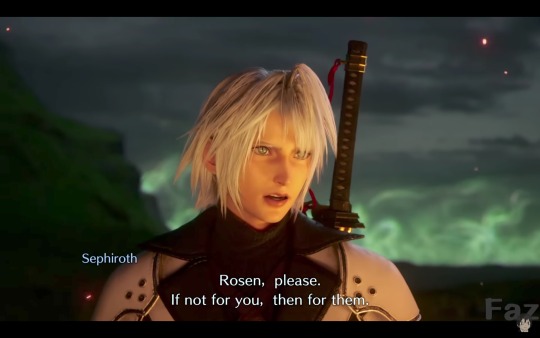
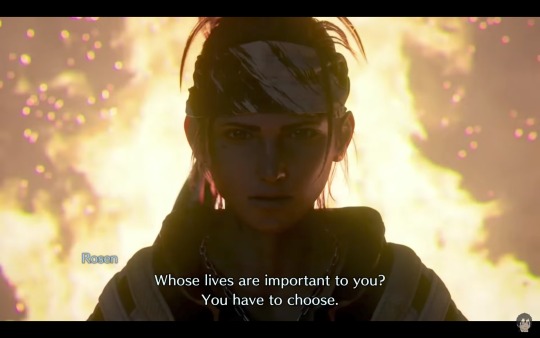
After some thought, it's probably best that SE gave Sephiroth a source of regret that influenced his future life. It is consistent with the events unfolding in Crisis Core and provides more insight into his state of mind following Genesis' desertion.
In Ever Crisis: First Soldier, Sephiroth was faced with a choice: either follow the request to kill someone or allow the people he had grown to care about to die. The decision resulted in a squabble with Glenn and a degree of estrangement. Later, EC Wutai segment shows that the event had left a lasting impact. Not only does Sephiroth appear to be more reluctant to resort to violence first thanks to Glenn, but he is implied to lament the fact that he couldn't save everyone (Rosen).
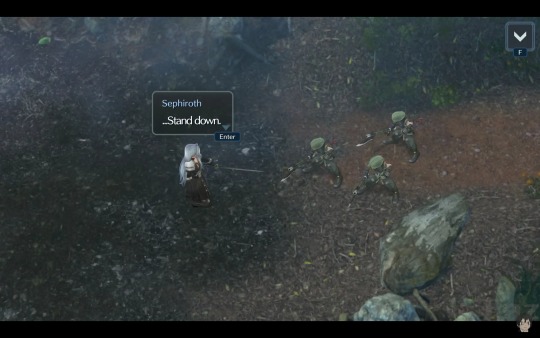
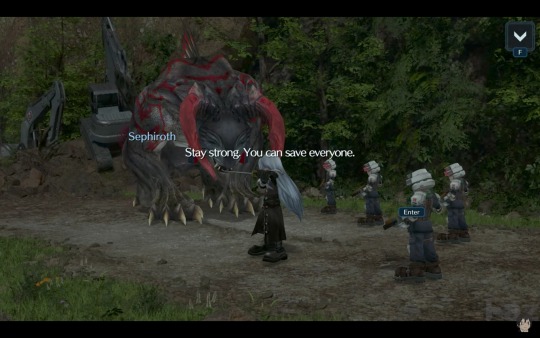
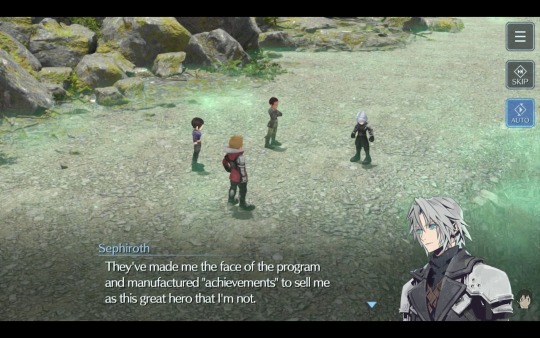
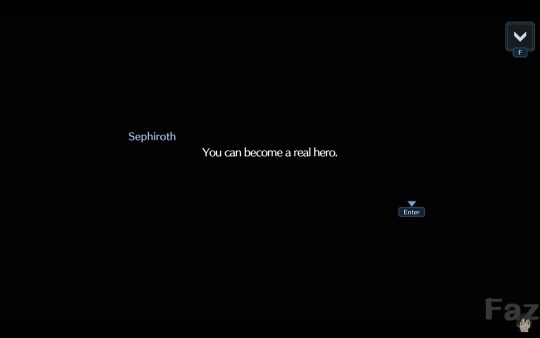
This contrast is evident in the inner conflict of being praised as a 'hero' (a manufactured image) versus the reality of being one. Sephiroth resolves to embody a true hero, striving to uphold strength and 'save everyone,' avoiding the difficult decisions of choosing who lives or dies as well as the burden of killing or witnessing death under his command. Sephiroth failed to convince Rosen and failed to find another way that brought about no casualties. Even ten years later, he pushes himself to clear a path for cornered grunts, fueled by his insecurity over past failures.
This insecurity also connects nicely to the events of Crisis Core. Sephiroth pushed those missions on Zack because he had a history of failing to persuade someone (Rosen) to change their minds, and the prospect of reliving the same situation while confronted with someone he cared about was unthinkable. It demonstrates that Rosen's case affected Sephiroth, leaving a lasting impression on his actions and decisions.
Even further, the desire to save and prevent casualties is evident in FFVII Rebirth, when the ShinRA squad, led by Zack and Sephiroth, is flung into the mountain stream after the rope bridge collapses. Sephiroth successfully grabs younger Tifa, but is unable to reach another grunt in time. The camera stays on the scene for a while, focusing on his slightly haunted expression.
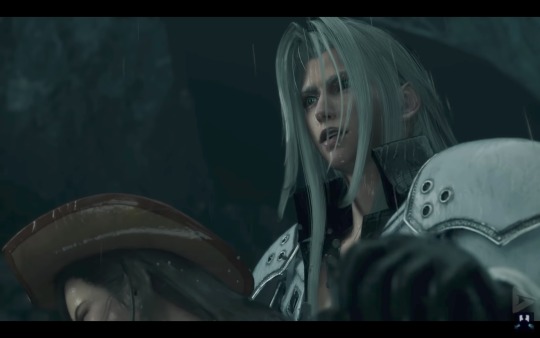
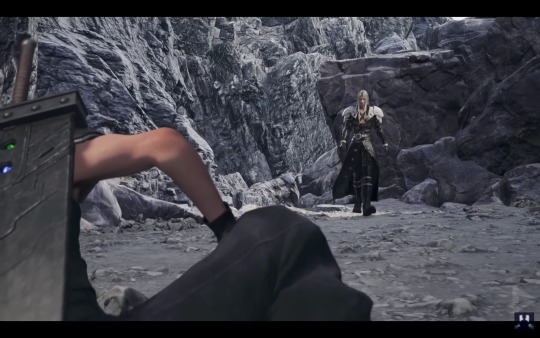
Following the cut, Sephiroth spends hours looking for his washed-away squadmate. Allow it to sink. After two hours, the rest of the company was still recovering from a dip in a harsh stream, but he was up and about, scouting the cross-country area and going out of his way to find the missing rank-and-file. It's a testament to more than just physical endurance. It strikes a stark contrast to how the episode concluded in the original game, where Sephiroth chose not to search for the missing person, leaving them potentially stranded or deceased. In the remake, it was clear he disliked losing people.
And yet, despite the efforts, it just kept happening. He couldn't save Angeal, he couldn't sway Genesis. By the time he arrives at the Nibelheim reactor, his confidence in his ability to save the day must have plummeted.
It oddly echoes what Cloud goes through at the beginning of Advent Children. And, chillingly, an illusory Sephiroth in Sector 8 in the first part of the remake delivers a biting remark to Cloud:
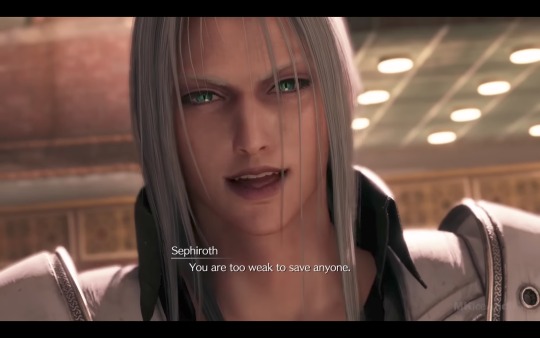
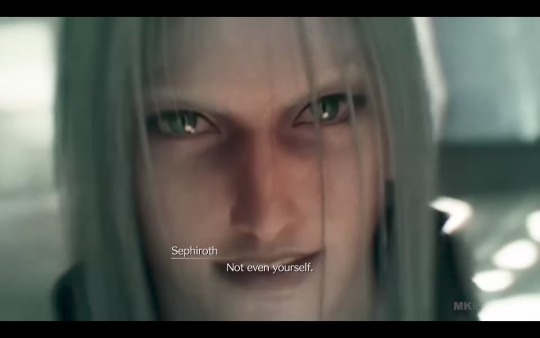
“You are too weak to save anyone. Not even yourself”.
Which sounds almost projection-like in the context of a broader compilation.
@pen-and-umbra
#ff7 ever crisis#sephiroth#ffvii ever crisis#ffvii ec#ffvii rebirth#ffvii remake#ff7 first soldier#ffvii#ff7#glenn lodbrok#final fantasy vii#ffvii@luv fandoms
297 notes
·
View notes